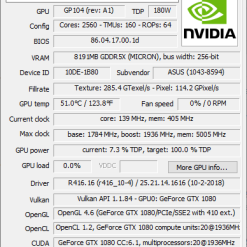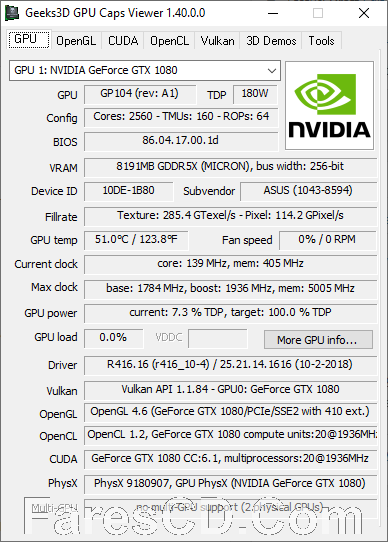برنامج عرض معلومات تفصيلية لكارت الشاشة | GPU Caps Viewer
تتميز معظم ألعاب الفيديو الحديثة بصور مذهلة لكنها بالتأكيد تستهلك الكثير من موارد الفيجا الخاصة بك.
هذا لا ينطبق فقط على الألعاب ، والتطبيقات المتخصصة تستفيد أيضًا من GPU.
يمكنك الحصول على تفاصيل حول بطاقة الفيديو المثبتة على الكمبيوتر الخاص بك من خلال أدوات مدمجة في نظام التشغيل الخاص بك.
ومع ذلك ، باستخدام أدوات مثل GPU Caps Viewer ، يمكنك وضعها في اختبارات متعددة.
وفى هذه التدوينة اقدم لكم آخر إصدار من هذا البرنامج
_
برنامج عرض معلومات تفصيلية لكارت الشاشة | GPU Caps Viewer
_
مميزات تطبيق GPU Caps Viewer
✔ تحليل دقيق لمواصفات GPU
يعرض التطبيق جميع تفاصيل معالج الرسوميات، مثل الاسم، التردد، عدد الأنوية، نوع الذاكرة، ودعمه للتقنيات الحديثة مثل Vulkan وOpenGL.
✔ اختبار الأداء (Benchmarking)
يحتوي التطبيق على اختبارات قياس الأداء، والتي تساعدك في معرفة مدى كفاءة الجهاز في تشغيل الألعاب ثلاثية الأبعاد.
✔ مراقبة درجة الحرارة واستهلاك الطاقة
يتيح لك التطبيق مراقبة درجة حرارة معالج الرسوميات، مما يساعد في منع ارتفاع الحرارة والحفاظ على أداء مستقر.
✔ عرض معلومات نظام التشغيل
لا يقتصر التطبيق على GPU فقط، بل يعرض أيضًا بيانات المعالج المركزي (CPU)، إصدار الأندرويد، ونوع الشاشة ودقتها.
✔ اختبارات OpenGL و Vulkan
يوفر التطبيق اختبارات عملية لواجهة OpenGL وVulkan، مما يسمح لك بتقييم توافق جهازك مع أحدث تقنيات الرسوميات.
✔ تقرير مفصل عن أداء الألعاب
يمكنك معرفة ما إذا كان هاتفك قادرًا على تشغيل ألعاب معينة بسلاسة أم لا، بناءً على نتائج الاختبارات.
طريقة استخدام GPU Caps Viewer
-
تحميل التطبيق
قم بتنزيل التطبيق من متجر Google Play، ثم قم بتثبيته على جهازك الأندرويد. -
فتح التطبيق واستعراض المواصفات
بمجرد فتح التطبيق، ستظهر لك جميع المعلومات الأساسية حول معالج الرسوميات، مثل نوعه، التردد، وعدد الأنوية. -
إجراء اختبار الأداء
انتقل إلى قسم الاختبارات (Benchmark)، واختر أحد الاختبارات المتاحة مثل OpenGL أو Vulkan، ثم اضغط على “ابدأ الاختبار”. -
تحليل النتائج
بعد اكتمال الاختبار، ستظهر لك نتائج الأداء، مثل عدد الإطارات في الثانية (FPS) والتحميل على المعالج. يمكنك مقارنة هذه النتائج مع متطلبات الألعاب التي ترغب في تشغيلها. -
مراقبة درجة الحرارة واستهلاك الطاقة
تابع حالة الجهاز أثناء تشغيل الألعاب الثقيلة وتأكد من أن درجة الحرارة لا ترتفع بشكل مفرط.
تحميل موفق للجميع
انتهى الموضوع
تابع أحدث و أفضل البرامج من قسم البرامج من هنا
مع تحيات موقع فارس الاسطوانات





































